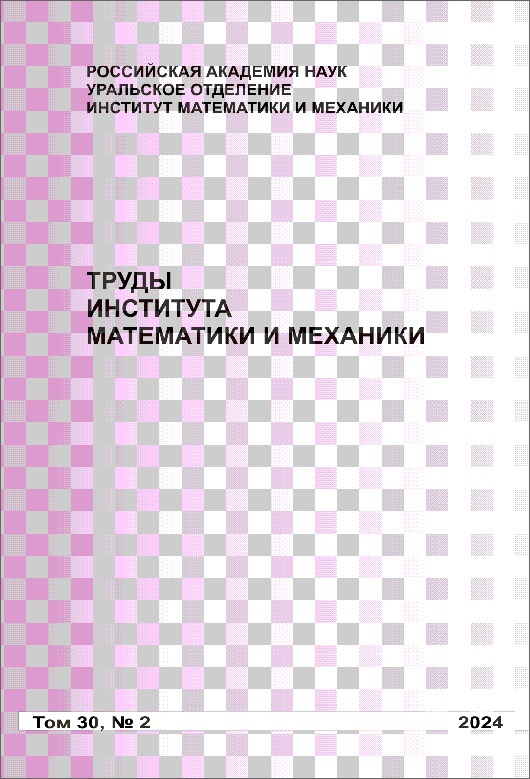|
Some supplements to S. B. Stechkin's inequalities in direct and inverse theorems on the approximation of continuous periodic functions
N. A. Ilyasova
a Baku State University
Abstract:
We give some supplements and comments to inequalities between elements of the sequence of best approximations {En−1(f)}∞n=1 and the kth-order moduli of smoothness ωk(f(r);δ), δ∈[0,+∞), of a function f∈Cr(T), where k∈N, r∈Z+, f(0)≡f, C0(T)≡C(T), and T=(−π,π], which were published by S. B. Stechkin in 1951 in the study of direct and inverse theorems of approximation of 2π-periodic continuous functions. In particular, we prove the following results:
(a) the direct theorem or the Jackson–Stechkin inequality: En−1(f)⩽C1(k)ωk(f;π/n), n∈N, can be strengthened as En−1(f)⩽ρ(k)n(f)≡n−kmax{νkEν−1(f):1⩽ν⩽n}⩽2kC1(k)ωk(f;π/n), n∈N. This inequality is order-sharp on the class of all functions f∈C(T) with a given majorant or with a given decrease order of the modulus of smoothness ωk(f;δ); namely: for any k∈N and ω∈Ωk(0,π], there exists a function f0(⋅;ω)∈C(T) (f0 is even for odd k and is odd for even k) such that ωk(f0;δ)≍C2(k)ω(δ), δ∈(0,π]. Moreover, order equalities hold: En−1(f0)≍C3(k)ρ(k)n(f0)≍C4(k)ωk(f0;π/n)≍C5(k)ω(π/n), n∈N, where Ωk(0,π] is the class of functions ω=ω(δ) defined on (0,π] and such that 0<ω(δ)↓0 (δ↓0) and δ−kω(δ)↓ (δ↑);
(b) a necessary and sufficient condition under which the inverse theorem (without the derivatives), or the Salem–Stechkin inequality ωk(f;π/n)⩽C6(k)n−k∑nν=1νk−1Eν−1(f), n∈N, holds is Stechkin's inequality ‖, where T_n(f)\equiv T_n(f;x) is a trigonometric polynomial of best C(\mathbb{T})-approximation to the function f (i.e., \|f-T_n(f)\|=E_n(f),\ n\in \mathbb{Z}_+);
\mathrm{(c)} the inverse theorem (with the derivatives), or the Vallée-Poussin–Stechkin inequality \omega_k(f^{(r)}; \pi/n)\le C_8(k,r)\big\{ n^{-k}\sum_{\nu=1}^{n}\nu^{k+r-1}E_{\nu-1}(f)+\sum_{\nu=n+1}^{\infty}\nu^{r-1}E_{\nu-1}(f)\big\} for any n\in \mathbb{N}, as well as Stechkin's earlier inequality E_{n-1}(f^{(r)})\le C_9(r)\big\{ n^r E_{n-1}(f)+\sum_{\nu=n+1}^{\infty}\nu^{r-1}E_{\nu-1}(f)\big\},\ n\in \mathbb{N}, where E(f;r)\equiv \sum_{n=1}^{\infty}n^{r-1}E_{n-1}(f)<\infty (by S. N. Bernstein's theorem, this inequality guarantees that f lies in C^r(\mathbb{T}), where r\in\mathbb{N}) can be supplemented with the following key inequalities: \|f^{(r)}\|\le C_{10}(r)E(f;r) and \|T_n^{(r)}(f)\|\le C_{7}(r)\sum_{\nu=1}^n\nu^{r-1}E_{\nu-1}(f), n\in\mathbb{N}. Moreover, all the inequalities formulated in this paragraph are pairwise equivalent; i.e., any of these inequalities implies any other and, hence, all the inequalities.
Keywords:
best approximation, modulus of smoothness, direct theorem, inverse theorem, order equality, equivalent inequalities, order-sharp inequality on a class.
Received: 02.06.2020
Revised: 28.08.2020
Accepted: 21.09.2020
Citation:
N. A. Ilyasov, “Some supplements to S. B. Stechkin's inequalities in direct and inverse theorems on the approximation of continuous periodic functions”, Trudy Inst. Mat. i Mekh. UrO RAN, 26, no. 4, 2020, 155–181
Linking options:
https://www.mathnet.ru/eng/timm1773 https://www.mathnet.ru/eng/timm/v26/i4/p155
|

| Statistics & downloads: |
| Abstract page: | 325 | | Full-text PDF : | 128 | | References: | 58 | | First page: | 12 |
|




 Contact us:
Contact us: Terms of Use
Terms of Use
 Registration to the website
Registration to the website Logotypes
Logotypes









 Citation in format
Citation in format 